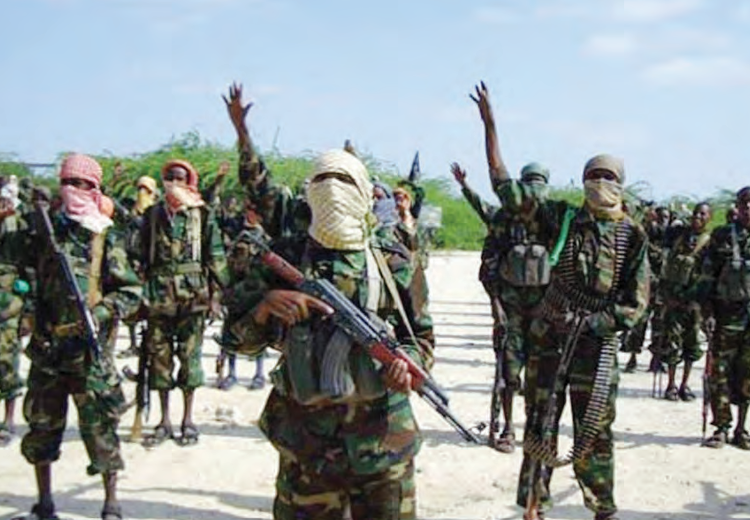President Bola Tinubu has warned terrorists and bandits tormenting Nigerians to surrender to the government forces or get killed.
Tinubu issued the warning at the 1st News Agency of Nigeria (NAN) annual international lecture held in Abuja with the theme: “Insecurity in the Sahel (2008-2024): Dissecting Nigeria’s challenges — Genesis, Impacts and Options.”
The president, who represented by the national security adviser, Mallam Nuhu Ribadu, said his administration had implemented kinetic and non-kinetic strategies to eliminate threats across the country in the last year.
He said the administration had also adopted a multifaceted approach to tackling the security challenges, as enshrined in the Renewed Hope Agenda, which prioritised security as a critical component of government focus.
“The administrations in the last year had put in place processes, policies and programmes to achieve improved security, economic development, and welfare for all Nigerians,” the president said.
Tinubu further stated that the administration had developed both kinetic and non-kinetic strategies towards considerably eliminating the threats of Boko Haram.
“Cowards, idiots, banditry, kidnapping for ransom and violent extremists. Bad people. I can assure you that people are here to confront you.
“Enough is enough. For 15 years, we’ve been going through hell in this country. Bad people are doing what they like. They continue to interfere with where we live, our lives, our commerce, our education, our health system, our transportation, and so on. And we sit down and stand and allow them? Enough is enough. It has to stop. It will stop.”
President Tinubu sent a strong warning to those involved in kidnapping for ransom, which he said had declined.
“It’s a warning to them. Short time remains. If you want to live, leave it this way. If you want to live your life, stop it. Examples have been sent. They have seen what is happening to their leaders.
“Now, non-kinetic energy is still important. Windows are open; doors are open. Suppose you are ready to come and surrender and stop it. Otherwise, you know what will happen to you, whoever you are.”
The president said that many people in the north are returning home following the restoration of peace in their communities, which would boost food production.
He remarked that kidnapping had replaced old crimes such as robbery and burglary.
“We have defeated armed robbery before in our country. We will also defeat kidnappers. It’s a matter of time. We are just only one year, three months or four months old. Give us time. Give us time. We have also taken steps to improve governance by strengthening institutions, promoting accountability and ensuring inclusive decision-making. Even those who corrupt people, be careful. It will come to you. It’s coming,” he warned.
According to the president, insecurity in the Sahel is complex, with deep roots in sundry causal factors such as climate change, food insecurity and extremism, which have created a ring of violence and instability.
“A secured Nigeria is a secure Sahel region because of our number, size, and strategic position where we are. We are fixing Nigeria and, you see, it will translate into good things for our neighbours who are indeed facing challenges and difficulties,” he said.
Tinubu lauded the lecture as a worthy contribution to the ongoing debate in the body of knowledge on the nation’s security architecture and what prognosis to make going forward.
“As an administration committed to uplifting the downtrodden from the shackles of poverty, we will continue to invest in job creation, infrastructure development and social services.”
He stated that President Tinubu, as chair of ECOWAS, was working to strengthen regional collaboration with neighbouring countries to share intelligence, coordinate security efforts, and address common challenges.
“ I am happy that we renewed the onslaught by our gallant troops against enemies of our nation in the northeast and north-west; our citizens can now heave a sigh of relief. We shall continue to provide our armed forces with the needed human and material resources to achieve success. No doubt there is no time other than now for all of us to work together to build a safer and more prosperous Nigeria,” he said
He reminded the gathering that in tackling threats the current administration was working much and talking less.
Poverty, Weak, Failed Institutions Created Fertile Ground for Insecurity in the Sahel – Abdulsalami
In his speech at the lecture, former Head of State General Abdulsalami Abubakar (rtd) stated that poverty, unemployment, weak governance, and failed institutions created a fertile ground for insecurity in the Sahel Region.
Abdulsalami, who chaired the occasion, said, “Permit me to note, however, that at the heart of the insecurity in this region, among other factors, are the undercurrents of poverty and unemployment, the proliferation of small arms and light weapons, weak governance, and institutional failures, as well as climate change and environmental degradation.
“These factors have created a fertile ground for insecurity to thrive, devastatingly impacting our nation. We must maintain faith in our capacity to rise above the storms of insecurity since this challenge is the business of every Nigerian and all Africans.
“Not only must we work together to find solutions to our country’s security challenges, but we indeed owe ourselves, our children, and future generations the duty to create a safer and more prosperous nation. May peace reign in our region and the world at large.”
The governor of Katsina State, Dikko Radda, stated that Nigeria’s armed forces had significantly combated insecurity. He disclosed that the military’s efforts had reduced insecurity in Katsina by 60-70 per cent.
The governor called on citizens to be essential to the military’s efforts by playing critical roles in ending insecurity. He also urged his fellow governors to address the root causes of banditry and terrorism, particularly poverty, illiteracy, and unemployment.
The chief of defence staff, General Christopher Musa, remarked that the Sahel region has, in the last decade and a half, become synonymous with instability, violence, and insecurity, ranging from the rise of insurgent groups such as Boko Haram and ISWAP to the spread of violent extremism, human trafficking, and illegal arms proliferation.
He said while insecurity did not emerge in a vacuum, its roots can be traced to a combination of local and global factors, including poor governance, economic marginalisation, climate change, ethnic tensions, and the spillover effects of conflicts in North Africa and the broader Middle East.
He stressed that the collapse of the Libyan state in 2011 further unleashed an influx of weapons and fighters, catalysing the rise of militant groups across the Sahel.
“Nigeria, as a critical player in the region, has borne a significant share of the fallout from this instability.”
The CDS admitted that the insurgency in the North East, led by Boko Haram since 2009, has not only devastated communities but also stretched military resources, forced the displacement of millions, and undermined economic development.
According to the Defence chief, the porous nature of Nigeria’s borders with Sahelian countries has made it easier for transnational criminals, including smugglers, human traffickers, and arms dealers, to operate with impunity.
He, however, said that Nigeria had demonstrated resilience and determination in confronting these challenges.
“I encourage all stakeholders, including government, civil society, international partners, and the private sector, to work collaboratively in addressing these challenges. Let us always remember that Nigeria’s security and that of the entire Sahel region depend on our ability to find lasting solutions that promote peace, stability, and prosperity for all,” he added.
Nigeria Winning War Against Terrorism, Banditry – FG
On his part, Nigeria’s minister of information and national orientation, Mohammed Idris, has reaffirmed that security remains a top priority in President Tinubu’s Renewed Hope Agenda.
The minister noted that the country is making significant progress in fighting insecurity through investments in equipment and manpower, acquisition of more fighting platforms, and intelligence gathering.
“Since taking office 16 months ago, 12 aircraft have been acquired to boost the fighting capacity of our Armed Forces,” he said.
Speaking at the first international lecture of the News Agency of Nigeria, Idris reiterated that the gathering was both timely and significant, as it provides an invaluable opportunity to delve deeply into the root causes of the violence ravaging the Sahel region, examine its impact on Nigeria’s territorial integrity, and explore solutions available to policymakers within their country’s security framework.
He emphasised that the Sahel region, stretching across Africa from the Atlantic Ocean to the Red Sea, has become a vortex of instability, violence, and conflict. Over the years, these unfortunate situations have escalated into a complex web of terrorism, organised crime, drug trafficking, arms smuggling, and violent extremism.
He said Nigeria shares a long and porous border with several Sahelian countries embroiled in conflict, making the country vulnerable to the spillover effects of these crises.
“This threatens our security and challenges our capacity to maintain effective control over our borders,” Idris warned.
The minister added that the violence in the Sahel is not an isolated issue, and no single country can tackle it alone, just as he noted that Nigeria had increased its engagement with neighbours and regional and international partners, strengthening joint military operations like the Multinational Joint Task Force and supporting initiatives to stabilise the region.
Idris also highlighted how extremist groups exploit poverty, weak governance structures, and climate challenges to establish a foothold in the region, posing significant threats not only to the directly affected countries but also to their neighbours, including Nigeria.
In his Independence anniversary address two days ago, President Tinubu highlighted his administration’s successes on the security front:
“I am happy to announce that our administration is winning the war on terror and banditry.
“Our goal is to eliminate all threats from Boko Haram, banditry, kidnapping for ransom, and violent extremism. In the past year, our government has eliminated Boko Haram and bandit commanders faster than ever. As of the last count, over 300 Boko Haram and bandit commanders have been eliminated by our gallant troops in the Northeast, Northwest, and other parts of the country,” Tinubu had said.
The minister expressed confidence in the experts gathered at the conference to dissect the root causes of these conflicts and develop innovative solutions.
“Several scholars and experts have attributed these challenges to socioeconomic marginalisation, weak governance structures, environmental degradation, and transnational organised crime. The spillover effects of these conflicts are taking a toll on our economy, internal security, and the well-being of our people.
“By understanding the root causes, evaluating the impact on our territorial integrity, and implementing strategic policy measures, we can effectively address the challenges posed by this crisis.
“The task ahead is daunting, but with determination, collaboration, and united effort, I am confident we can safeguard Nigeria’s territorial integrity and contribute to restoring peace and stability in the Sahel region,” he said.
ECOWAS To Activate 5000-Man Force to Fight Terrorists
The Economic Community of West African States (ECOWAS) Heads of State and Government have disclosed plans to activate a 5000-man force to tackle terrorism in the region.
The President of the ECOWAS Commission, Omar Touray, disclosed this on Thursday in Abuja at an International lecture organised by the News Agency of Nigeria.
The regional bloc also disclosed that 1,605 terrorist attacks had been recorded between January and August 2024 in West Africa, with a total of 6,956 fatalities.
Touray was represented by Isaac Armstrong, the Programme Officer, Regional Security Division, Department of Political Affairs, Peace and Security, ECOWAS Commission, who have a breakdown of the figures also pointed out the terrorism had spread in the region.
He said, “On the directives of the ECOWAS Heads of State and Government, efforts are ongoing to set up a 5000-man Kinetic Force to fight against terrorism using the platform of the ECOWAS Standby Force. This regional resolve does not take away the responsibility bestowed on individual Member States to take full ownership of their national security responsibilities.
“Undoubtedly, terrorism is the primary security threat faced by ECOWAS Member States. Initially confined to certain countries in the Sahel (Mali and Niger) and the Lake Chad Basin (Nigeria), terrorist attacks have multiplied and spread to other countries (Burkina Faso) and are now a real threat to coastal countries (Benin, Côte d’Ivoire, Togo).
“In 2024, from January to August, statistics from our Early Warning and Regional Security data platforms show that a total of 1605 attacks have been recorded in the region with a total of 6956 fatalities with Burkina Faso accounting for 611 attacks and 3810 fatalities; Mali 546 with 1424 attacks, Nigeria 238 attacks with 905 fatalities, Niger 153 attacks with 676 fatalities; Benin 44 attacks with 66 fatalities and Togo 13 attacks with 75 fatalities.”
In 2023, he noted, 3,587 terrorist attacks were recorded in the ECOWAS region. The attacks include about 2000 in Burkina Faso, over 1044 in Mali, and 500 in Niger.
“These incidents have resulted in close to 9000 fatalities: including 7000 in the 3 Sahelian Countries of Burkina Faso, Mali and Niger. Terrorist incidents in the coastal region include 177 in Benin and Togo that resulted in 203 deaths.
“In addition to the unbearable toll on human lives, insecurity continues to have dire humanitarian consequences. In just the three ECOWAS Sahelian Countries, i.e. Burkina Faso, Mali, and Niger, a total of 4.8 million people face food insecurity, 2.4 million people were internally displaced, and close to 9000 schools remain closed,” he added.
According to him, a disaggregation of the data shows that Burkina Faso has the highest number of food-insecure people, close to 2.2 million, followed by Niger with 1.9 million, and Mali with about 800 000.
“Burkina Faso also accounts for the largest number of internally displaced people – about two million; while Mali and Niger each have close to half a million displaced persons. The number of schools closed stood at 6,000 in Burkina Faso, 1700 in Mali and 1000 in Niger,” he added.





